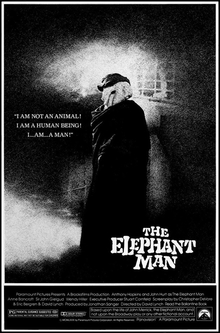| The Elephant Man | |
|---|---|
 Theatrical release poster | |
| Directed by | David Lynch |
| Screenplay by |
|
| Based on |
|
| Produced by | Jonathan Sanger |
| Starring | |
| Cinematography | Freddie Francis |
| Edited by | Anne V. Coates |
| Music by | John Morris |
Production company | |
| Distributed by |
|
Release dates |
|
Running time | 123 minutes[2] |
| Countries | United Kingdom United States[3] |
| Language | English |
| Budget | $5 million |
| Box office | $26 million (North America)[4] |
The Elephant Man is a 1980 biographical drama film loosely based on the life of Joseph Merrick (referred to as "John" in the film), a severely deformed man who lived in London in the late 19th century. The film was directed by David Lynch, produced by Jonathan Sanger, and executive produced by Mel Brooks (who was uncredited, to avoid audiences anticipating the film being in the vein of his comedic works, although his company Brooksfilms is in the opening credits). It stars John Hurt, Anthony Hopkins, Anne Bancroft, John Gielgud, Wendy Hiller, Michael Elphick, Hannah Gordon, and Freddie Jones. The Elephant Man is generally regarded as one of Lynch's more accessible and mainstream works, alongside The Straight Story (1999).
The screenplay was adapted by Lynch, Christopher De Vore, and Eric Bergren from Frederick Treves' The Elephant Man and Other Reminiscences (1923) and Ashley Montagu's The Elephant Man: A Study in Human Dignity (1971). It was shot in black-and-white and featured make-up work by Christopher Tucker.
The Elephant Man was a critical and commercial success with eight Academy Award nominations, including Best Picture, Best Director, Best Adapted Screenplay, and Best Actor. After receiving widespread criticism for failing to honour the make-up effects, the Academy of Motion Picture Arts and Sciences was prompted to create the Academy Award for Best Makeup the following year. The film also won the BAFTA Awards for Best Film, Best Actor, and Best Production Design and was nominated for Golden Globe awards. It also won a French César Award for Best Foreign Film.
- ^ Higgins, John (October 8, 1980). "The Elephant Man, which opens tomorrow at the ABC, Shaftesbury Avenue, is also likely to establish the reputation of its director, David Lynch". The Times. p. 9.
- ^ "The Elephant Man". British Board of Film Classification. Archived from the original on August 5, 2020. Retrieved November 8, 2022.
- ^ "The Elephant Man (1980)". BFI. Archived from the original on September 10, 2020. Retrieved February 22, 2019.
- ^ "The Elephant Man (1980)". Box Office Mojo. Retrieved July 4, 2010.